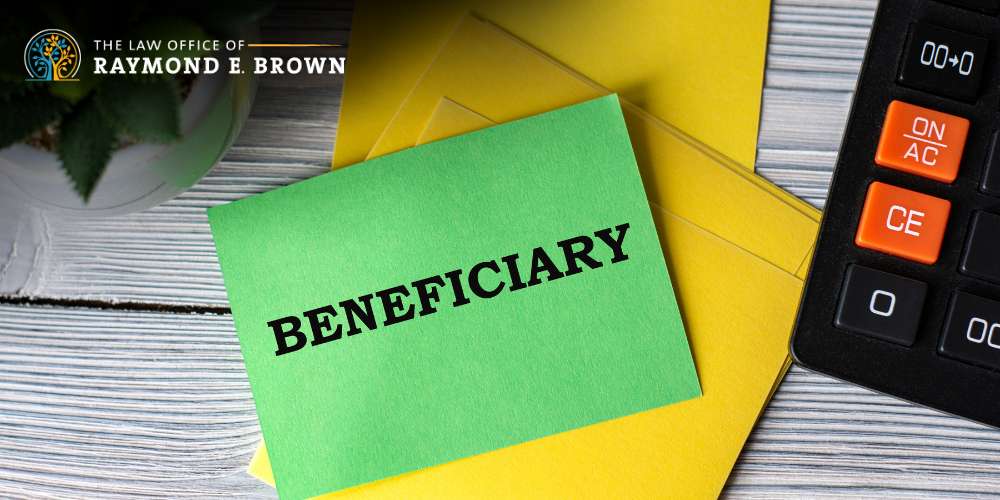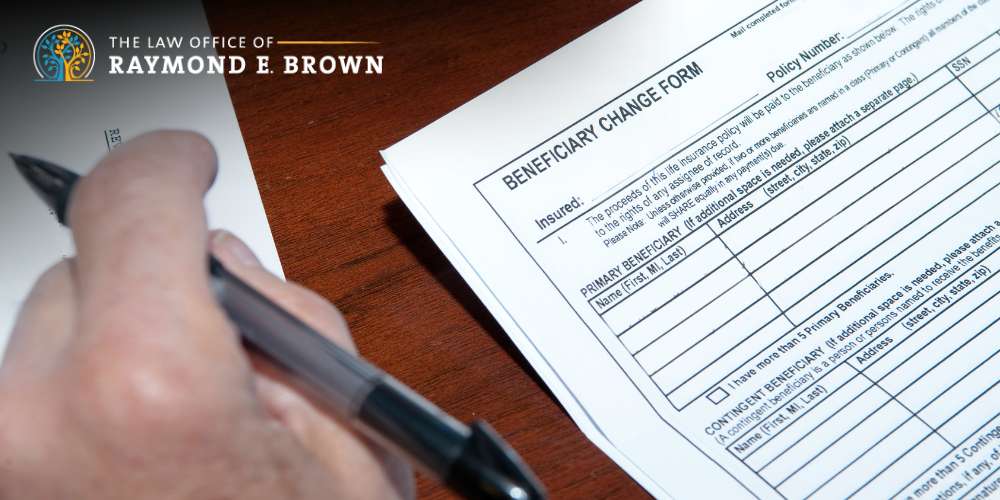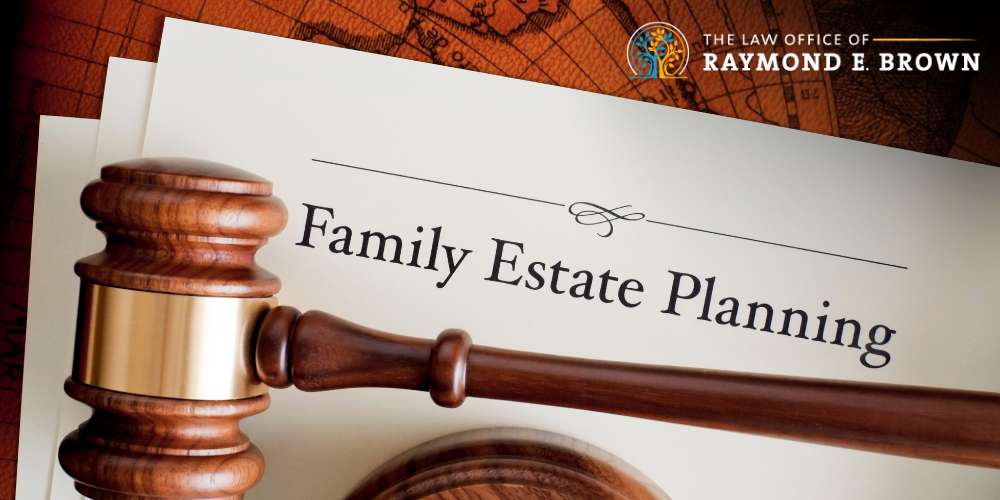A contingent beneficiary is a person or entity designated to receive assets if the primary beneficiary is unable or unwilling to accept the inheritance. In estate planning, understanding the difference between a primary vs. contingent beneficiary is essential to ensure your assets pass smoothly in the event of unforeseen circumstances.
For example, if your primary beneficiary passes before you, the contingent beneficiary will step in and inherit the designated assets. This prevents the assets from being subject to the probate process, which can be time-consuming and expensive.
If you need help understanding how to properly designate contingent beneficiaries or want to ensure your estate plan is thorough and up to date, contact the experienced Maryland estate planning attorneys at The Law Office of Raymond E. Brown at (443) 554-9944. Our experienced team can assist you with all aspects of estate planning to protect your loved ones and your assets.
What is a Beneficiary?
First things first – what’s a beneficiary? A beneficiary is an individual or entity that is legally designated to receive assets or benefits from an estate, trust, life insurance policy, or financial account. Primary beneficiaries are typically named in estate planning documents such as a last will and testament or trust. When the insured or account holder passes away, the primary beneficiaries inherit the assets or death benefit specified in the document.
However, in the case that the designated beneficiary cannot accept the inheritance, you will need a contingent beneficiary to ensure the assets are passed on according to your wishes.
What Does Contingent Beneficiary Mean?
A contingent beneficiary, also called a secondary beneficiary, is named to inherit assets only if the primary beneficiary cannot receive them. This could happen for several reasons: the primary beneficiary may have passed away, declined the inheritance, or become legally incapacitated.
Contingent beneficiaries provide a backup plan, ensuring that your assets pass as you intended, even if the primary person named is unable to accept the inheritance. Without a contingent beneficiary, your estate could go through probate, a lengthy legal process that can delay the inheritance process and even result in the distribution of assets in a way you didn’t intend.
Difference Between Primary Beneficiary and Contingent Beneficiary
The main difference between a primary beneficiary and a contingent beneficiary lies in the order of inheritance. A primary beneficiary is the first in line to receive assets or death benefits when you pass away. If they are unable to accept the assets—because of death or incapacity, for example—the contingent beneficiary would step in. If neither primary beneficiaries nor contingent beneficiaries are named, your estate could be subject to probate, which may lead to delays and additional legal fees.
For example, if you name your spouse as the primary beneficiary of your life insurance policy and your child as the contingent beneficiary, your child will be the one to inherit the life insurance proceeds if your spouse predeceases you.
Who Should Be Contingent Beneficiary?
Selecting a contingent beneficiary is an important part of estate planning. Many people choose family members, such as children, grandchildren, or even siblings. You could also select a trusted friend or an organization, such as a charity, to inherit your assets. It’s important to consider individuals who can responsibly manage the inheritance, especially if they are receiving significant assets or the proceeds of a life insurance policy.
For instance, if you have two children, you may name one as your primary beneficiary and the other as your contingent beneficiary. Alternatively, if you have more than one child, you can name multiple contingent beneficiaries to ensure your assets are distributed fairly.
Can You Have Multiple Contingent Beneficiaries?
Yes, you can name multiple contingent beneficiaries in your estate plan. If the primary beneficiary is unable to receive the inheritance, the assets can be divided among as many contingent beneficiaries as you designate. However, it’s important to specify how you want your assets divided among the contingent beneficiaries by percentage. For example, if you have three children, you might decide that each of your three children should receive an equal share of the inheritance, or that the oldest receives a slightly larger percentage. Whatever makes the most sense to you.
When considering how many contingent beneficiaries to name, it’s important to think about the future needs of your heirs. You can designate contingent beneficiaries for various assets, assuring that your estate plan is comprehensive and flexible. Naming multiple beneficiaries is a good way to guarantee your assets are distributed according to your wishes, even if the primary beneficiary cannot inherit them.
Can the Same Person Be a Primary and Contingent Beneficiary?
No, the same person cannot be both a primary and contingent beneficiary for the same asset or policy. This is because, as you now know, the roles of primary beneficiaries and contingent beneficiaries are distinct. A primary beneficiary is the first to receive the inheritance, while the contingent beneficiary only receives assets if the primary beneficiary cannot. However, a person can be a primary beneficiary for one asset and a contingent beneficiary for another.
Case in point: you might name your spouse as the primary beneficiary of your life insurance policy and your child as the contingent beneficiary for that same policy. However, your child could be the primary beneficiary of a retirement account while being a contingent beneficiary for other assets.
Can a Contingent Beneficiary Be a Minor?
Yes, minor children can be contingent beneficiaries, but it’s important to plan carefully if this is the case. Minors cannot legally inherit assets until they reach the age of majority, so a legal guardian will need to be appointed to manage the inheritance on their behalf. You can also set up a trust to hold the assets for the minor until they reach a certain age. This can help protect the inheritance and ensure that it is used for the minor’s benefit.
For example, if it makes sense for you to name your child as a contingent beneficiary, you may want to create a trust and appoint a trustee to manage the assets until your child reaches adulthood.
How To Name a Contingent Beneficiary in Maryland
Generally, naming a contingent beneficiary in Maryland involves following specific steps to ensure your estate plan is legally binding. Proper documentation, signatures, and witnesses are necessary to avoid complications. You can name contingent beneficiaries in various estate planning documents, including:
- Wills – In your will, you can designate primary and contingent beneficiaries to inherit specific assets, such as real estate or personal property. The will must be properly signed and witnessed according to Maryland state law.
- Trusts – A trust allows you to pass assets to beneficiaries outside of probate. When setting up a trust, you can name primary and contingent beneficiaries to receive trust assets. Be sure to include all necessary information, such as the beneficiary’s social security number and percentage of assets to be inherited.
- Retirement Accounts and Life Insurance Policies – For accounts like a life insurance policy or retirement account, you’ll need to fill out a beneficiary designation form provided by the account administrator or insurance company. Be sure to list both primary and contingent beneficiaries. Remember, however, that the contingent beneficiary assignment works only if the primary beneficiary cannot inherit the assets upon the insured’s death.
Legal Requirements in Maryland
Maryland law requires certain formalities when making your beneficiary designations:
- Proper Documentation: Estate planning documents, including wills and trusts, must be in writing and clearly identify the named beneficiary and/or beneficiaries. According to Maryland.gov, “Handwritten wills are valid in Maryland. Electronic wills are valid only in very limited circumstances. Audio, oral, and video wills are not valid in Maryland.”
- Witnesses and Signatures: Wills in Maryland must be signed by the testator (the person making the will) and witnessed by two individuals who are present at the same time. Trusts and beneficiary designation forms also require proper signatures to be valid.
How To Review and Update Beneficiary Designations
It’s important to regularly review and update your beneficiary designations, especially after major life changes like marriage, divorce, or the birth of a child. Outdated beneficiary designations can lead to unintended consequences, such as assets going to an ex-spouse or a deceased person’s estate passing through probate.
Amending Wills and Trusts: To update your will or trust, you can either amend the document or create a new one. It’s important to work with an estate planning attorney to ensure that your changes are legally binding.
Updating Financial and Insurance Accounts: For financial accounts, life insurance policies, and your bank account, you’ll need to fill out a new beneficiary designation form with your account administrator or insurance company. Be sure to provide complete details regarding whom you want to get your assets, and specify whether you are naming a primary beneficiary, contingent beneficiary, or both.
How an Estate Planning Attorney Can Help
An experienced Annapolis estate planning attorney like those at The Law Office of Raymond E. Brown can help guide you through the process of naming primary and contingent beneficiaries, ensuring that your estate plan is thorough and up-to-date. They can also assist in drafting wills, setting up trusts, and ensuring that your retirement accounts and life insurance policies are properly documented.
What’s more, by working with an attorney, you can make sure to avoid common pitfalls, such as improper beneficiary designations, and can receive knowledgeable answers to all your questions and concerns, such as how to avoid probate in Maryland or how to minimize your estate taxes. An attorney can also help you make necessary changes to your estate plan as your life circumstances evolve.
Call The Law Office of Raymond E. Brown For All Your Annapolis Estate Planning Needs
If you need help with estate planning, including assistance with naming primary and contingent beneficiaries, contact the Law Office of Raymond E. Brown at (443) 554-9944 or reach out online today. Our experienced Maryland estate planning attorneys can help you create a comprehensive estate plan tailored to your specific situation.
Don’t wait until it’s too late – protect your assets and your loved ones right away by getting in touch with The Law Office of Raymond E. Brown for all your Annapolis estate planning needs.






